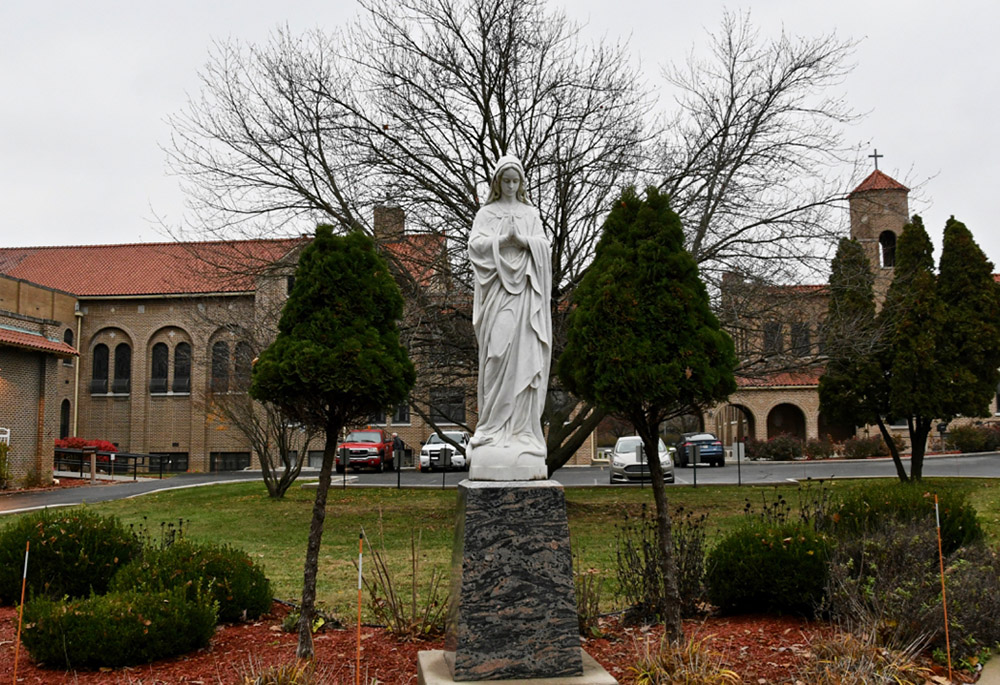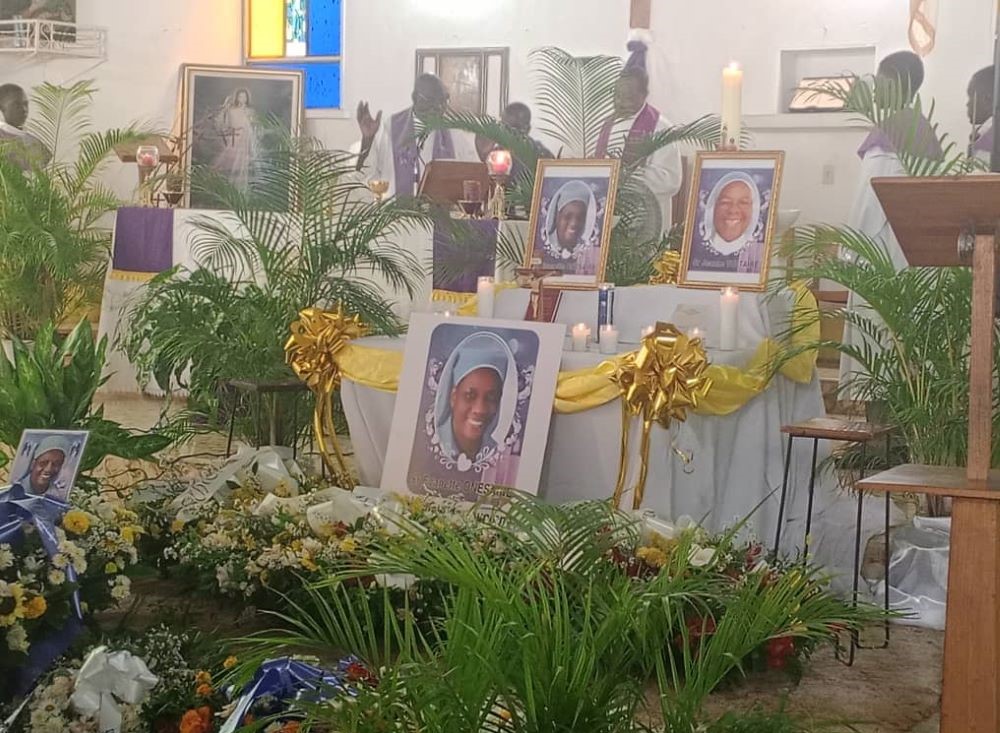
The Spanish Mission style buildings on the Victory Noll campus in Huntington, Indiana, have been sold to the county community corrections program for its drug court program aimed at getting drug addicts treatment instead of jail terms. (GSR photo/Dan Stockman)

Four U.S. religious communities — the Grand Rapids Dominicans, Sisters of Providence of St.-Mary-of-the-Woods, Poor Handmaids of Jesus Christ and Wheaton Franciscans — have joined 15 other religious communities in a Land Justice Futures program that supports religious communities in incorporating land justice efforts into their long-term property plans.
As the newest members of Focus Communities, the four are committed to "racial, ecological, economic and social healing into their land discernment processes," Land Justice Futures, formerly known as the Nuns and Nones Land Justice Project, said in an April 14 announcement.
The group said the four communities are reframing "land discernment not as an administrative task but as a prophetic opportunity for healing and transformation."
Land Justice Futures, founded in 2022, helps religious communities in their land efforts through education, technical assistance and community-building. The Focus Community program convenes communities from across the country for an immersive cohort experience, providing tailored coaching and accompaniment, the group said.
Related: Whose land is this land? Sisters, Native tribes begin process of land justice
"We aim to bring clarity to what it means to do justice at the intersection of climate change, racism and forced migration," Sr. Marybeth Martin, provincial councilor of the Poor Handmaids of Jesus Christ, said in the statement.
"By integrating justice into every decision we make about our land, we are laying a foundation for future action — one that extends beyond our current leadership team and the two-year cohort, ensuring a meaningful legacy," she said.
In a welcome statement during a March 20 online gathering, Pat McCabe, a Diné (Navajo) elder and an adviser to Land Justice Futures, noted the power of what they have done. "Sisters have always been ahead of the curve, and I've witnessed this firsthand through this program," she said.
"What we share, my people and women religious, is faith," McCabe added. "This can be a leading edge toward a very different future — a future of shifted consciousness and healing."
"This has been a journey like no other," Sr. Kathleen Storms, a member of the School Sisters of Notre Dame, said of her community's two-year participation in the program. "The support we've received through coaching, meetings and webinars has strengthened our congregation's response. We didn't just gain 'head' knowledge, we gained 'heart' knowledge.' "
Focus Communities are committed to making "meaningful strides toward land justice," including revising land ethics policies, forming land justice committees, exploring stewardship partnerships and investing in neighboring land reclamation efforts, Land Justice Futures said.
"You never know what new insight will surface. This is a time to open ourselves to new possibilities," said Sr. Kate Hendel, a member of the Sisters of Charity of the Blessed Virgin Mary who serves on her community's leadership team.
Brittany Koteles, the co-founder and director of Land Justice Futures, told GSR that the current political moment "requires new ways of thinking and acting for all of us, and land justice is a part of that new equation."

A funeral service for two sisters Little Sisters of St. Thérèse of the Child Jesus who were killed March 31 in gang-related violence was held April 12 at the congregation’s motherhouse in Rivière-Froide, a suburb of the Haitian capital of Port-au-Prince. (Courtesy of Denise Desil)
Memorial services held for slain Haitian sisters
Memorial services have been held throughout Haiti for two members of the Little Sisters of St. Thérèse of the Child Jesus, who were murdered in gang-related violence in the central Haiti city of Mirebalais.
Mourners honored Srs. Evanette Onesaire, 74, and Jeanne Siliane Voltaire, 71, both teachers who were killed March 31.
Related: Two Catholic sisters killed in Haiti gang violence
A funeral service was held April 12 at the congregation's motherhouse in Rivière-Froide, a suburb of the capital of Port-au-Prince, said Sr. Denise Desil, the mother general of the Haitian religious congregation.
However, the service was conducted without the sisters' remains, Desil told Global Sisters Report. Their bodies have yet to be recovered because "the situation is still not safe in Mirebalais," she said, adding that gangs still control the city of about 2,000, located about 30 miles northeast of Port-au-Prince.
The sisters' bodies remain at a residence that gang members stormed after attacking stores and police stations in Mirebalais.
Citing local media reports, the Agenzia Fides, the information service of the Pontifical Mission Societies, reported that gang members entered the home, opened fire and killed the two sisters, as well as others in the building.
Desil told GSR that three others were also killed in the attack, and that it was unlikely the sisters were specific targets.
The violence in Mirebalais is an example of gang-related violence spreading outside Port-au-Prince and other Haitian urban centers, with the gangs vowing to control all of Haiti.
The incident in Mirebalais was the latest tragedy in a deteriorating security situation for the Caribbean nation, in which as many as 12,000 heavily armed gang members have taken de facto control of many cities, including Port-au-Prince.
Illinois sisters go solar
Cloistered nuns live their lives closed off from the world. But a group of Poor Clares in western Illinois has found a way to go even further off the grid — literally.
The 11 nuns at the Poor Clare Monastery of Our Lady of Mercy are moving forward with a plan to run the convent entirely on solar energy, captured by nearly 150 photovoltaic modules, reports the Belleville News-Democrat.
While the newspaper highlighted the irony of nuns without television, internet, radio or private phones going solar, the sisters pointed to rising electric bills for the monastery.
Disconnecting from the electric grid will allow them to further their vocation of separation from the outside world.
They had considered installing the panels on the roof, but didn't want to hurt the aesthetics of the monastery, built in 1989 and dominated by a large, round chapel and a cross-shaped convent, the paper said.
Though the 8 acres of convent grounds are mostly wooded, there is a clearing that was once baseball fields.
"We only needed to cut down two trees," Sr. Regina Buchanan told the News-Democrat. "All the other trees are remaining. They're far enough from the system that they won't shade it."
The installation made the news because the size of the array qualifies under Belleville zoning laws as a solar farm, though it will only supply power to the convent.
"It's not a farm," said Rae Liening, project manager with StraightUp Solar, the company hired by the sisters, the paper reported. "It's a commercial-size solar system. [That's needed] because the monastery is larger than a home."
Zoning officials unanimously voted to recommend the project, and Belleville City Council members approved the request April 10.
Advertisement
Indian court rejects nun's pre-arrest bail in conversion case
A court in central India's Chhattisgarh state has denied bail for a Catholic nun, who faces arrest after a student from her nursing college accused the nun of attempting to convert her to the Catholic faith.
A lower court in the predominantly tribal district of Jashpur on April 11 dismissed the anticipatory bail application of Sr. Bincy Joseph, principal of Holy Cross Nursing College in Kunkuri town.
The nun's lawyer, Selerius Tirkey, told UCA News on April 14 that they plan to appeal and that a team appointed by the top district official is now probing the case.
"The case is fabricated and totally false," the lawyer said.
The complainant told local media that she was barred from taking her final exam and denied entry to the campus for resisting the nun's attempts to convert her.
In an April 7 statement, the nun said the "student's allegations are a calculated attempt to defame the institution and cover up her own academic shortcomings."
The nun, a Sister of Mercy of Holy Cross, said the student completed a three-year graduation course but skipped the practical sessions, which are mandatory to take the final exam.
The complainant also lacked the required attendance to appear for the exam.
However, right-wing activists picked up the case and conducted a massive protest in Kunkuri on April 10.
Abhinandan Xalxo, president of the Jashpur Catholic Sabha (church), told UCA News on April 14 that these cases are fabricated to tarnish the church and its institutions. "This is a trumped-up case. The nun did not succumb to pressure to violate norms and allow the complainant to attend her final exam. That's the issue," he said.
The pro-Hindu Bharatiya Janata Party of Prime Minister Narendra Modi runs the government in the state, where increasing violence against Christians has been reported, as well as social boycotts, assaults and threats from Hindus who want them to return to the Hindu religious fold, their leaders said.
Christians make up less than 2% of Chhattisgarh's 30 million people.






